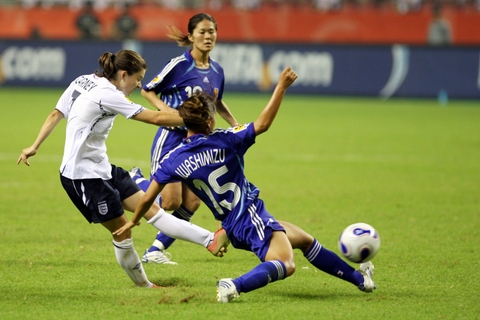Soccer, also known as football, is the most popular sport in the world.
It is played by millions of people in almost every country, and it has a rich and complex history that spans centuries.
One of the most debated topics in soccer history is the question of who invented the sport. While there are many theories and claims about the origins of soccer, the true inventor of the game remains a mystery.
Some historians believe that soccer has its roots in ancient civilizations, such as China, Greece, and Rome, where people played games that involved kicking a ball.
Others argue that soccer originated in medieval England, where villagers played a game called "mob football" that involved kicking a ball between two villages.
Over time, the game evolved into a more organized sport, with rules and regulations that were established by various groups and organizations.
Despite the many claims and theories about the origins of soccer, one thing is clear: the sport has a long and fascinating history that continues to evolve to this day.
Whether you are a die-hard fan of the game or simply curious about its origins, there is always more to learn about the world's most popular sport.
Historical Origins of Soccer
Soccer, also known as football, has a long and fascinating history that dates back to ancient times.
While the exact origins of the sport are not entirely clear, there are several theories about how it came to be.
Ancient China and Cuju
One of the earliest known forms of soccer was a game called Cuju, which was played in China during the Han Dynasty (206 BCE-220 CE).
Cuju involved kicking a leather ball through a small hole in a piece of silk, and it was often used as a form of military training. The game eventually spread to other parts of Asia, including Japan and Korea.
Greek and Roman Influences
The ancient Greeks and Romans also played games that involved kicking a ball.
The Greeks played a game called Episkyros, which involved two teams trying to get a ball over the other team's boundary lines.
The Romans played a similar game called Harpastum, which was played on a rectangular field and involved passing and kicking a ball.
Native American and Indigenous Games
In North America, various indigenous groups played games that involved kicking or throwing a ball.
The Native American game of Marn Grook, played by the Djab Wurrung and Jardwadjali people of western Victoria, Australia, involved kicking a ball made of possum skin.
The Maori people of New Zealand played a game called Ki-o-rahi, which involved kicking and catching a ball while running around a circular field.
Medieval and Early Modern Variations
In medieval Europe, various forms of folk football were played, which involved kicking a ball between two villages or teams.
These games were often violent and chaotic, and there were few rules.
Over time, the sport became more organized, and in the 19th century, various codes of football were developed in Britain, France, and Italy.
These codes eventually led to the modern game of soccer that we know today.
Codification and Standardisation
Football, like many other sports, was initially played without any formalised rules.
As a result, the game was often played differently depending on the region, school or even the individual players involved.
However, in the mid-19th century, there was a growing demand for codification and standardisation of the game, which led to the development of the modern rules of football.
Public Schools and Cambridge Rules
The first attempts at standardising the rules of football were made by public schools in England.
In 1848, Cambridge University drafted one of the first sets of common rules for the game, known as the Cambridge Rules.
These rules were widely adopted by many schools and clubs in the country, and they formed the basis of the game's development.
Formation of The Football Association
In 1863, several football clubs in London came together to form The Football Association (FA) in England.
The purpose of the FA was to formalise the rules of the game and establish a governing body to oversee its development.
The FA was responsible for creating the Laws of the Game, which set out the rules for football that are still used today.
Distinction from Rugby Football
It is worth noting that football and rugby were not always distinct sports. In fact, they were often played together and were known as "football" until the mid-19th century.
However, as the rules of both games became more formalised, they began to diverge. Rugby football, for example, allowed players to carry the ball, while football did not.
Global Expansion and FIFA
Football's popularity continued to grow in the late 19th and early 20th centuries, spreading to continental Europe and South America.
The first international match was played between Scotland and England in 1872, and the first international tournament, the British Home Championship, was held in 1884.
Football clubs were established in Germany, France, and other European countries, and the sport quickly gained a foothold in South America, particularly in Uruguay.
Spread to Continental Europe and South America
Football was introduced to continental Europe by British expatriates and quickly gained popularity.
The first football club on the continent was established in Paris in 1863, and by the turn of the century, the sport had spread to Germany, France, and other European countries.
The first international match between two continental European teams was played between France and Belgium in 1904.
In South America, football was introduced by British sailors and expatriates in the late 19th century.
The first football club was established in Buenos Aires in 1867, and by the early 20th century, the sport had become the most popular in the region.
Uruguay, in particular, became a football powerhouse, winning the gold medal at the 1924 and 1928 Olympics and the first FIFA World Cup in 1930.
Establishment of FIFA and FIFA World Cup
As football's popularity grew around the world, there was a need for a governing body to oversee the sport.
In 1904, representatives from seven European countries met in Paris to establish the Fédération Internationale de Football Association (FIFA), with the aim of promoting and regulating the sport worldwide.
The first president of FIFA was Robert Guérin, a Frenchman.
FIFA quickly expanded, with member associations from around the world joining in the following years.
The first FIFA World Cup was held in 1930 in Uruguay, with 13 teams competing for the title.
The tournament was a success, and the World Cup has since become the most prestigious and widely watched football tournament in the world, with billions of viewers tuning in to watch the matches.
Evolution of the Game
Football, or soccer as it is widely known, has undergone significant changes since its inception.
The game has evolved from a simple pastime to a professional sport with major leagues and technological advancements that have revolutionised the way the game is played and officiated.
Changes in Rules and Regulations
The laws of the game have undergone several changes since the first official rules were established in England in 1863.
The introduction of offside rules, penalty kicks, and the use of yellow and red cards are just a few of the many changes that have been made to the game over the years.
These changes have been implemented to make the game fairer, safer, and more enjoyable for players and fans alike.
Professionalism and Major Leagues
The introduction of professional players and major leagues has transformed football into a global phenomenon.
The Football League, founded in England in 1888, was the first professional football league in the world. Today, there are major leagues in countries all over the world, including Major League Soccer in the United States.
Technological Advancements and VAR
Technology has played a significant role in the evolution of football.
The introduction of video assistant referees (VAR) has revolutionised the way the game is officiated.
VAR allows referees to review decisions made on the field and make more accurate calls.
Other technological advancements, such as goal-line technology and improved ball designs, have also had a significant impact on the game.
Cultural Impact of Soccer
Soccer has become a global phenomenon and has had a significant impact on popular culture and media.
It is the world's most popular sport, with millions of players and fans worldwide.
The FIFA World Cup, held every four years, is the most-watched sporting event in the world, attracting billions of spectators.
Soccer as a Global Phenomenon
Soccer has become a cultural phenomenon with immense global appeal. It has transcended national boundaries and has become a unifying force for people around the world.
The sport has become an integral part of the social fabric of many countries. People of all ages and backgrounds play and watch the game.
The sport has also played a significant role in promoting cultural exchange and understanding. Soccer has brought people from different countries and cultures together, fostering greater understanding and respect for each other's traditions and customs.
Influence on Popular Culture and Media
Soccer has had a significant influence on popular culture and media. The sport has inspired countless books, films, and television shows, and has become a staple of popular culture.
The exploits of soccer players such as Lionel Messi and Cristiano Ronaldo have become the stuff of legend, inspiring millions of fans around the world.
Soccer has also had a significant impact on the fashion industry, with soccer jerseys and other merchandise becoming popular fashion items. The sport has also inspired countless works of art, with artists using soccer as a subject for their paintings, sculptures, and other works.


















